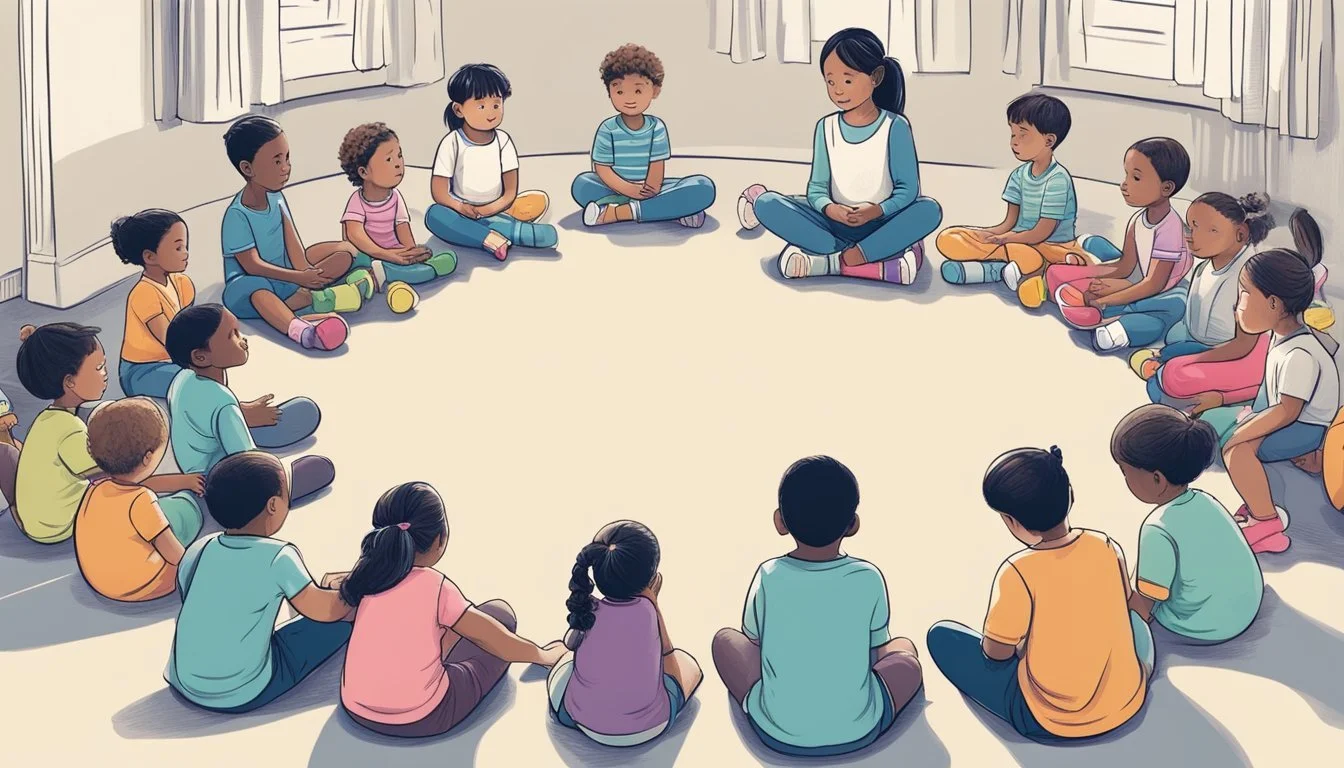Identifying Early Signs of Self-Centered Behavior in Children
Narcissistic traits can emerge in children as young as 6 years old, though true narcissistic personality disorder is rare and not typically diagnosed until adulthood. Some signs of narcissistic behavior in young children include difficulty making friends, an inflated sense of self-importance, and a lack of empathy for others.
While it's normal for children to be self-centered at times, persistent narcissistic behaviors may indicate a need for professional intervention. Parents and caregivers can help by setting clear boundaries, encouraging empathy, and modeling healthy relationship skills. It's important to remember that a child's personality is still developing at this age.
Early intervention and supportive parenting can make a significant difference in shaping a child's emotional development. If concerns persist, consulting with a mental health professional who specializes in child psychology can provide valuable guidance and support for both the child and family.
Understanding Narcissism in Young Children
Narcissism in young children can be complex and often misunderstood. It's crucial to differentiate between normal developmental behaviors and potential signs of narcissistic traits.
Definition and Basics of Narcissistic Personality Disorder
Narcissistic Personality Disorder (NPD) is a mental health condition characterized by an inflated sense of self-importance and a deep need for excessive attention and admiration. In children, early signs may include:
• Difficulty accepting criticism • Exaggeration of achievements • Expectation of constant praise • Lack of empathy for others
NPD is not typically diagnosed in children under 18, as personality is still developing. However, some traits may emerge in childhood that could indicate a predisposition to narcissistic tendencies.
Differentiating Normal Self-Centeredness from Narcissistic Traits in Children
Young children naturally exhibit self-centered behaviors as part of their development. This is different from narcissistic traits. Normal self-centeredness in children includes:
• Difficulty sharing toys • Wanting to be the center of attention • Limited understanding of others' feelings
Narcissistic traits, on the other hand, may manifest as:
• Persistent inability to empathize with peers • Extreme reactions to perceived slights • Consistently belittling or bullying others
It's important to note that occasional self-centered behavior is normal in children. Persistent patterns of extreme self-focus and lack of empathy may warrant professional evaluation.
Recognizing Signs of Narcissism in a 6-Year-Old
Identifying narcissistic traits in young children requires careful observation of specific behaviors and patterns. While some self-centered tendencies are normal at this age, certain signs may indicate more concerning narcissistic tendencies.
Key Symptoms and Behaviors to Observe
Excessive need for attention and admiration is a primary sign of narcissism in 6-year-olds. These children may monopolize conversations and constantly seek praise. They often exaggerate their abilities and achievements.
Lack of empathy is another crucial indicator. A narcissistic child may struggle to understand or care about others' feelings. They might belittle peers or show little concern when others are upset.
Frequent tantrums when they don't get their way can also signal narcissistic tendencies. These outbursts may be more intense and prolonged than typical childhood tantrums.
• Difficulty accepting criticism • Believe they are superior to others • Manipulative behavior to get what they want
Distinction between Narcissistic Tendencies and Developmental Phases
It's essential to differentiate between normal developmental behaviors and true narcissistic traits. Many 6-year-olds display self-centered behaviors as part of their natural growth.
Healthy children gradually develop empathy and learn to consider others' perspectives. They may be self-focused but still show care for friends and family. In contrast, narcissistic children consistently struggle with empathy across various situations.
Normal childhood boasting differs from the grandiose claims of narcissistic children. While all kids may exaggerate sometimes, narcissistic children persistently inflate their importance and abilities.
Typical 6-year-olds can handle not being the center of attention. Narcissistic children become visibly distressed when they're not the focus.
Psychological and Emotional Aspects
Narcissistic tendencies in 6-year-olds stem from complex psychological and emotional factors. These include underdeveloped empathy, difficulties regulating emotions, and struggles with self-esteem and shame.
Role of Empathy and Emotions in Narcissism
Young children with narcissistic traits often struggle to understand and relate to others' feelings. They may have difficulty recognizing emotional cues or considering perspectives different from their own. This lack of empathy can lead to self-centered behaviors and a disregard for others' needs.
Emotional regulation is another challenge. These children may experience intense emotions but lack the skills to manage them effectively. This can result in outbursts, attention-seeking behaviors, or attempts to control situations to avoid negative feelings.
The Impact of Shame and Self-Esteem on Narcissistic Behavior
Contrary to appearances, children exhibiting narcissistic behaviors often grapple with low self-esteem. Their inflated sense of self-importance serves as a defense mechanism against underlying feelings of inadequacy or shame.
Shame plays a significant role in narcissistic development. When children feel deeply flawed or unworthy, they may compensate by presenting an idealized version of themselves. This can manifest as boastful behavior, exaggerating achievements, or belittling others to feel superior.
Self-esteem issues in these children are often rooted in early experiences of criticism, neglect, or inconsistent praise. They may struggle to develop a stable sense of self-worth, leading to a constant need for external validation and admiration.
Family Dynamics and Upbringing
The family environment plays a crucial role in shaping a child's personality development. Parenting styles, family structure changes, and traumatic experiences can all contribute to narcissistic traits in young children.
Influence of Parenting Styles on Narcissistic Development
Authoritarian parenting, characterized by high demands and low responsiveness, may foster narcissistic tendencies in children. Parents who are overly critical or emotionally unavailable can lead a child to develop a fragile self-esteem.
Permissive parenting, with its lack of boundaries, can also contribute to narcissistic traits. Children raised without limits may struggle to recognize others' needs and feelings.
Conversely, authoritative parenting, which balances warmth with appropriate discipline, tends to produce more emotionally balanced children. This style promotes empathy and healthy self-esteem.
Effects of Divorce, Trauma, and Abuse on Childhood Narcissism
Divorce can significantly impact a child's emotional development. The stress and instability associated with parental separation may lead some children to develop narcissistic coping mechanisms.
Childhood trauma, such as physical or emotional abuse, can disrupt normal personality development. Children who experience abuse may adopt narcissistic traits as a defense mechanism.
Neglect can also play a role in narcissistic development. Children who don't receive adequate attention may become self-centered to compensate for their unmet emotional needs.
Family therapy can be beneficial in addressing these issues. It provides a space for healing and can help parents understand how their behaviors impact their child's development.
Managing Narcissistic Behaviors
Addressing narcissistic tendencies in young children requires consistent, thoughtful parenting approaches. Parents can implement specific strategies at home, but professional help may be necessary in some cases.
Effective Parental Responses and Strategies
Set clear boundaries and enforce consequences consistently. When a child displays entitled behavior, calmly explain why it's inappropriate and redirect their attention to more positive activities.
Encourage empathy by discussing others' feelings. Use real-life situations to help the child understand different perspectives. Praise effort and kindness rather than innate qualities or achievements.
Avoid excessive criticism, which can reinforce narcissistic defenses. Instead, provide constructive feedback focused on specific behaviors. Model healthy self-esteem and emotional regulation.
Teach problem-solving skills to reduce the child's need for constant attention or special treatment. Encourage age-appropriate independence and responsibility.
When to Seek Professional Help from a Therapist
Consider professional intervention if narcissistic behaviors persist despite consistent parenting efforts. A therapist can assess underlying causes and provide specialized guidance.
Signs that warrant professional help include:
Extreme difficulty maintaining friendships
Inability to handle criticism or disappointment
Severe anxiety or depression related to self-image
A child psychologist may recommend play therapy or cognitive-behavioral techniques. Family therapy can also be beneficial, addressing dynamics that may contribute to narcissistic traits.
Early intervention is crucial. With proper support, children can develop healthier emotional patterns and improved social skills.
Therapeutic Approaches and Interventions
Effective treatment for childhood narcissistic tendencies involves targeted therapeutic approaches. These methods aim to address underlying issues and promote healthier behavioral patterns in young children.
Understanding Family Therapy in the Context of Child Narcissism
Family therapy plays a crucial role in addressing narcissistic behaviors in 6-year-olds. It focuses on improving family dynamics and communication patterns. Therapists work with parents and siblings to create a supportive environment.
Key aspects of family therapy include:
Identifying and modifying enabling behaviors
Enhancing empathy within the family unit
Teaching effective praise and consequence strategies
This approach helps children develop a more realistic self-image. It also encourages the formation of healthier relationships with family members.
The Role of Psychotherapy in Treating Childhood Narcissistic Tendencies
Individual psychotherapy can be beneficial for children exhibiting narcissistic traits. Therapists use age-appropriate techniques to address underlying emotional needs.
Common therapeutic methods include:
Play therapy to explore feelings and behaviors
Cognitive-behavioral techniques to challenge distorted thinking
Social skills training to improve peer interactions
The therapist works to build trust and create a safe space for the child. This allows for the exploration of self-esteem issues and the development of coping mechanisms.
Psychotherapy aims to foster self-awareness and emotional regulation in young children. It helps them recognize the impact of their behavior on others.
Narcissism and the Spectrum of Personality Disorders
Narcissistic personality disorder exists on a continuum of personality disorders. It shares traits with other conditions but has distinct diagnostic criteria and treatment approaches.
Narcissistic Personality Disorder in Relation to Other Disorders
Narcissistic personality disorder (NPD) is one of several Cluster B personality disorders. It shares some features with borderline, histrionic, and antisocial personality disorders.
NPD is characterized by grandiosity, need for admiration, and lack of empathy. Borderline personality disorder involves unstable relationships and self-image. Histrionic personality disorder features attention-seeking and emotional overreaction.
These disorders can co-occur or be mistaken for each other. Proper diagnosis requires careful evaluation by a mental health professional. Differential diagnosis considers symptom patterns, onset, and duration.
Diagnosis and Treatment Options
Diagnosing NPD in children under 18 is challenging. Personality is still developing, and some narcissistic traits are normal in youth. Clinicians look for persistent patterns of grandiosity, entitlement, and lack of empathy.
Diagnostic tools include:
Clinical interviews
Behavioral observations
Psychological testing
Treatment typically involves long-term psychotherapy. Cognitive-behavioral therapy and psychodynamic approaches can be effective. Family therapy may help address childhood roots of narcissism.
Medication is not a primary treatment for NPD. However, it may be prescribed for co-occurring conditions like depression or anxiety.
Conceptualizing the Future Path
Addressing narcissistic traits in young children requires a long-term perspective focused on potential consequences and strategies for healthier development. Early intervention and consistent support play crucial roles in shaping more positive outcomes.
Long-Term Consequences and Prognosis
Untreated narcissistic tendencies in children can lead to significant challenges in adulthood. These may include difficulties forming genuine relationships, reduced empathy, and struggles with emotional regulation. Children exhibiting narcissistic behaviors often face social isolation and academic issues as they grow older.
Professional intervention is key to improving prognosis. With appropriate therapy and support, many children can develop healthier coping mechanisms and improve their interpersonal skills. However, progress typically requires sustained effort over several years.
Parental involvement is crucial. Caregivers must consistently model empathy, set clear boundaries, and provide constructive feedback. This helps create a nurturing environment that supports the child's emotional growth and self-awareness.
Developing Healthier Coping Mechanisms and Self-Image
Building a more balanced self-image is essential for children with narcissistic traits. This process involves:
Teaching emotional intelligence skills
Encouraging perspective-taking exercises
Promoting cooperative play and teamwork
Reinforcing realistic self-assessment
Therapists often use cognitive-behavioral techniques to help children recognize and modify unhealthy thought patterns. Role-playing exercises can improve empathy and social skills.
Praising effort rather than innate qualities helps foster a growth mindset. This approach encourages children to value personal improvement over comparing themselves to others.
Mindfulness practices can be beneficial, teaching children to observe their thoughts and emotions without judgment. This skill supports better self-regulation and reduces impulsive behaviors.
Critical Considerations and Misconceptions
Common beliefs about childhood narcissism often miss important nuances. Understanding the truth behind these ideas helps provide better support for children exhibiting narcissistic traits.
Confronting Myths About Narcissism in Children
Many assume narcissistic traits in young children automatically lead to Narcissistic Personality Disorder (NPD) later in life. This is not always the case. Children naturally go through developmental stages of self-centeredness. Most outgrow these phases.
Experts caution against labeling children as narcissists prematurely. A formal NPD diagnosis cannot be made until adulthood. Early intervention can help redirect concerning behaviors.
Some believe narcissistic children lack all empathy. In reality, empathy develops gradually. Many children with narcissistic tendencies can learn to consider others' feelings with guidance.
The Complexity of Separation Anxiety and Narcissism
Separation anxiety is sometimes mistaken for narcissistic behavior in children. Both can involve demands for attention and difficulty coping without a caregiver. The underlying causes differ significantly.
Separation anxiety stems from fear of abandonment. Narcissistic traits often relate to an inflated sense of self-importance. Proper assessment is crucial for appropriate treatment.
Children with separation anxiety may appear self-centered when stressed. This differs from the persistent pattern seen in narcissistic behavior. Professional evaluation helps distinguish between the two.
Addressing separation anxiety can reduce behaviors that mimic narcissism. Strategies include gradual exposure to separation and building coping skills.








